- Home
- Simon Beckett
The Calling Of The Grave dh-4 Page 10
The Calling Of The Grave dh-4 Read online
Page 10
I took a drink of coffee and wondered yet again what Sophie might want. It had to be connected to Jerome Monk's escape somehow, but for the life of me I couldn't see how. Or why she'd contacted me. We'd enjoyed each other's company but I wouldn't have called us friends, and neither of us had made any attempt to keep in touch.
So why would she want to see me again after all this time?
My coffee had gone cold. Looking at my watch I saw it was nearly half past one. I frowned: after the way she'd sounded the day before I wouldn't have expected her to be late. But I wasn't sure how far she had to travel, so she could easily have been held up. I picked up the menu and restlessly flicked through it, glancing at the entrance every few minutes.
I gave it another quarter of an hour before calling Sophie's mobile number. At least there was a signal, which wasn't always certain out here. I listened to the clicks of connection, then I heard her voice: Hi, you've reached Sophie. Please leave a message.
I asked her to call me and hung up. Perhaps one of us got the time wrong, I told myself.
But two o'clock came and went with no sign of her. Restlessly, I checked the time again. Even if she'd been held up, I would have expected to hear something by now. Unless she was coming by train? I'd assumed she'd be driving but I hadn't asked. Pushing away my cold coffee, I went to the bar.
'Can you tell me when the next train's due in?'
The barmaid looked at the clock behind the bar. 'Nothing now for another two hours.' She gave me a bright smile. 'Late, is she?'
I smiled politely and went back to my table. But there seemed little point in waiting any longer. Grabbing my coat, I went out.
The sun had disappeared behind a high blanket of cloud, casting a diffuse, opalescent light as I walked the hundred yards to the train station. It was too small to have a ticket office, just two uncovered platforms linked by a short bridge. Both were empty, but there was a timetable on the noticeboard. The barmaid was right: there was nothing else due for a couple of hours. The only other train listed must have been the one I'd seen leaving as I'd arrived. Sophie obviously hadn't been on that.
So where was she?
A crow caw-cawed as it circled overhead; otherwise there was silence. I stood on the edge of the platform, staring up the line. The tracks were rusted but for the very tops, testament to how few trains used them. They ran straight, curving out of sight just before they reached vanishing point.
Now what?
I'd no idea. I wasn't even sure what I was doing there. I'd driven over two hundred miles for a woman I hadn't seen in eight years, and been stood up for my trouble. But although I tried to convince myself there was a mundane explanation, I couldn't quite believe it. Sophie had sounded desperate to see me: if she knew she was going to be late she would have called to let me know.
Something was wrong.
I went back to my car and took my road atlas from the boot. I had satnav but a large-scale map would give me a better feel for the geography of the place. Sophie had said she lived in a village called Padbury, which the map showed was several miles away. I didn't have her address, but it couldn't be that big. I'd just have to ask around until I found somebody who knew her.
Padbury was signposted well enough, but each marker seemed to direct me further and further away from civilization. The roads grew increasingly smaller, until I found myself on a narrow, single-lane track hemmed in by high bramble hedgerows. Bare except for dead scraps of leaves, they towered above the car like a maze. In snow or icy conditions the place would be completely cut off. As I shifted down yet another gear to negotiate a blind corner I wondered what the hell had brought Sophie out here.
But then I'd no reason to talk: I'd made a similar choice once myself.
Within another mile or two the hedgerows gave way to thickets of stunted oak. They seemed to soak up what was left of the daylight, and although it was only mid-afternoon I had to switch on my headlights. I began to wonder if I could somehow have missed Padbury after all, and then I rounded a bend and found myself in it.
And out of it again, just as quickly. It was more a hamlet than a village, and I had to carry on for another half-mile before there was anywhere wide enough to turn around.
I was already starting to have a bad feeling about this. I'd hoped for at least a pub or post office where I might find someone who knew where Sophie lived, but other than a few stone cottages there was only a small church, set back from the road. I pulled up outside but left the engine running. Now I was here it seemed ridiculous. Even if I could find her house, turning up on her doorstep unannounced like this was starting to seem more and more like an over reaction.
But I was here now. With a sigh I got out of the car and made my way up the church path. Ancient stone gravestones flanked it, many of them set flat into the overgrowing turf, their inscriptions eroded to illegibility. The church door was wooden, black with age and hard as iron. It was also locked.
'Can I help you?'
The accent was pure Devon, sounding like something from an older, more peaceful age. I turned to find an elderly woman standing by the church gate. She wore a quilted jacket and tweed skirt, and an expression that was as watchful as it was polite.
'I'm looking for someone called Sophie Keller. I think she lives in the village?'
She pondered, slowly shaking her head. 'No, I don't think so.'
'This is Padbury, isn't it?' I asked, wondering if I might be at the wrong place.
'It is, but there's no Sophie Keller lives here.' Her face brightened. 'There's a Sophie Trask, though. Are you sure you've got the right name?'
It was possible that Sophie could have changed it – or married – since I'd last seen her, but she'd made no mention of it when we'd spoken. Still, I might as well make sure. I agreed that I might have made a mistake and asked for directions.
'You can't miss it,' the woman called after me as I got back into my car. 'Watch out for the kiln.'
Kiln? That made less sense than ever. But I realized what she meant soon enough. I followed the road out of the village, passing the point where I'd turned around earlier, and saw the curving shape through the bare trees about a quarter of a mile ahead. It was a squat, inverted cone, built of the same rusty-coloured bricks as the house it stood next to. When I drew closer I saw it looked on the verge of collapse. A rickety framework of scaffolding clung to one side, either to repair it or prop it up.
I pulled on to the verge in front of the overgrown garden fence. The dusk was thickening, but the house windows were unlit.
Whoever lived here didn't appear to be home. A neat contemporary sign was fixed to one of the wooden gateposts: Trask Ceramics.
I almost drove away when I saw that. This had to be someone else. Yet Sophie had said she lived in Padbury, and according to the map there was only one in Dartmoor. You've come this far…
A stone-flagged path led to the house through a voguishly overgrown garden. A small orchard grew at one side, its scrubby apple trees now bare of leaves and fruit. The kiln sprouted on the other, tall and faintly sinister. The air held an autumnal odour of woodsmoke as I pushed open the gate. A vague sense of trespassing mingled with embarrassment that I was here at all. I told myself again how ridiculous this was, but there was also an uneasy sense of deja vu. I'd been in this situation once before, gone to check on someone to convince myself I was worrying about nothing.
I hoped history wasn't about to repeat itself.
Blown leaves from the orchard crisped underfoot as I walked up the path. There was still no sign of life from the house, its windows sheer panes of black. If someone was in I would simply make my apologies; if not… Well, first things first. I reached out to knock on the door.
And saw the freshly splintered wood where the lock had been forced.
All the doubts I'd had seemed to congeal in that second. The door was partly ajar, but I didn't push it open. The possibility that this could still be a stranger's house, that there might be an innocent reason for th
e smashed door, flashed through my mind, but I dismissed it. I looked around, half expecting to see someone behind me. But there was only the dark path, and the whispering branches of the trees.
The door creaked as I pushed it open with my fingertips. It swung back to reveal a darkened hallway.
'Anyone home?'
The silence was deafening. If I went inside I could be laying myself open to all sorts of trouble, but I didn't see that I'd any choice. If I called the police what would I say? That there were signs of forced entry at a house that might or might not belong to someone I knew?
If somebody's just lost their key you're going to look really stupid, I thought, and stepped into the hallway. Everything looked normal, but then I saw an old pine cabinet at the foot of the stairs, its drawers pulled open and their contents scattered. A vase lay shattered nearby, the broken pottery looking like pieces of bone on the floor.
'Sophie!'
I hurried inside, turning on the lights. There was no answer. I knew I should call the police but if I did I'd be told to wait outside until a car arrived.
That might be too late.
I quickly checked the downstairs rooms. They'd been ransacked, drawers and cupboards torn open and emptied, cushions flung off sofas and chairs. There was no sign of anyone so I ran upstairs. I noticed now that the carpet had wet patches on it, but I ignored it when I realized it was only water. All the doors at the top were closed, except for the bathroom. It was slightly ajar.
Through the gap I could see a pair of bare legs on the floor.
I rushed forward. A woman's body lay behind the door, blocking it so that I had to squeeze through. She was lying on her back, a towelling bathrobe fallen open. One arm was flung across her face, and a tangle of still-damp hair covered it further.
No blood. That was my first thought, but when I knelt beside her I saw that one side of her face was swollen in a livid purple bruise.
But even with that, and the fact that it was eight years since I'd last seen her, I still recognized Sophie Keller.
I moved aside the spill of hair and felt her throat. Her skin was cold but the pulse was steady. Thank God. I eased her into the recovery position, gently pulling the bathrobe down to cover her. There was no mobile reception, so I ran back down to the phone I'd seen in the kitchen. My voice wasn't quite steady as I called emergency
Hurrying back upstairs, I covered Sophie with a quilt from the bedroom. Then, sitting next to her on the hard floor, I took her hand and waited for the ambulance to arrive.
Chapter 11
I had to stay behind to give my statement while the ambulance ferried Sophie to hospital. I watched it go from the path just outside the front door, no siren yet but the blue light was bright and urgent, strobing through the dark branches as it disappeared up the lane.
It took nearly forty minutes for the first paramedics to arrive. During that time I'd not moved, sitting cramped on the bathroom floor with Sophie, talking to her constantly to reassure her that help was on the way, that everything would be all right. I'd no idea if she could even hear me. But there are different degrees of consciousness: if Sophie was aware on some level there was always a chance.
It wasn't as if there was anything else I could do.
The paramedics couldn't tell me much. Her vital signs were stable, which was something. But there was no knowing how serious the head trauma was, or if she had any other internal injuries. The police arrived as the ambulance crew were bringing her down the stairs. The blackness of the country night was broken by flashing lights, giving the bare trees in the orchard an eerie, spectral hue. I stood by helplessly as Sophie was carried out to the waiting ambulance, answering the flat-voiced questions of a policewoman. When she asked what my relationship was to Sophie I hesitated.
'I'm an old friend,' I said, not even sure if that was true.
As I'd waited for help to arrive I'd debated what to say. I'd no way of knowing if this had anything to do with Jerome Monk or not. The ransacked house looked like a burglary that had gone wrong, except for the timing. Sophie had called me asking for help, not long after Terry Connors had shown up to warn me of Monk's escape. And whoever had attacked her had done so before she could meet me and explain.
In the end I told the police everything, letting them decide whether or not to act on it. The policewoman's interest pricked up on hearing Monk's name, and so did her questions. Finally, frustrated with repeating 'I don't know,' I gave in to the inevitable.
'You need to call DI Terry Connors,' I told her.
I was loath to bring him into this, but I hadn't much choice. Feeling like a criminal myself, I sat in the back of the police car with the policewoman's partner while she made the call. Finally, she came back.
'OK, you can go.'
It wasn't what I'd expected. 'Doesn't he want to speak to me?'
'We've got your statement. Somebody'll be in touch.' She gave me a smile that wasn't unfriendly. 'I hope your friend's all right.'
So did I.
The ambulance was taking Sophie to hospital in Exeter. As I drove there myself I tried not to dwell on the fact that the last time I'd been on this route, eight years before, I'd been going to the mortuary. The hospital had undergone some modernization since then, but not so much that I couldn't recognize it. The receptionist behind the Emergency desk was an overweight woman with a neat fringe of greying hair. She frowned as she stared at her computer screen after I gave her Sophie's name.
'No one called that's been admitted tonight,' she said. 'You sure you've got the right hospital?'
I was about to argue when I realized my mistake. 'Sorry. Try Sophie Trask.'
She gave me an odd look but tapped at her keyboard. 'She was admitted to intensive care about an hour ago.'
Even when it's expected, there's still something ominous about the phrase intensive care. 'Can I find out how she is?'
'Are you a family member?'
'No, just a friend.'
'We're not allowed to give out that information unless you're the partner or a relative.'
I sighed, trying not to snap. 'I only want to know if she's all right.'
'I'm sorry. Perhaps if you phone tomorrow morning…'
Frustrated, I went back outside. The hospital was a black rectangle behind me as I returned to my car, the bright squares of its windows deceptively cheerful in the darkness. Now what? I'd have called Terry myself, but I didn't have his mobile number and I doubted he'd be at his desk at this time of night.
But there was no point in staying here. I hadn't packed for an overnight trip, and if anything happened I'd find out as quickly at home as anywhere else. Even so, it felt like running away as I started the car engine and left the hospital behind. I stopped at the first garage I came to and bought a sandwich and caffeine drink. One was tasteless, the other sickly sweet, but I'd had nothing to eat or drink since breakfast and it was a long drive back to London.
The day's events replayed in my head as I drove. I'd gone to meet Sophie expecting to have at least some questions answered. Now there were more than ever.
The roads were quiet and I made good time to start with, but then the rain increased into a deluge that hazed the road with spray, smearing the windscreen like Vaseline despite the furious efforts of the wipers. I was forced to slow down, peering to make out the road ahead as the tail lights of the cars in front were reduced to dull red smudges. The downpour eased as I reached the outskirts of London, but not before a tension headache had settled into my neck and temples. I squinted against the street lights and brightly lit shops, the glare made worse by their mirror images on the rain-shiny pavements.
It was a relief when I finally turned on to my own road and parked outside my flat. It was after midnight. There were no other lights on, which meant my neighbours were either out or asleep. Unlocking the door, I bent to retrieve the usual assortment of bills and fliers, and as I straightened I felt a sudden sensation of being watched.
I quickly turned round, but the
dark street was empty. I realized I was holding my breath, waiting for something to shatter the quiet, and forced myself to relax.
You're tired and imagining things. It's nothing.
Still, as I closed the door I was annoyed at myself. It was over a year since I'd almost been killed on my own doorstep: I'd thought I was past flinching at shadows.
Obviously not.
I went inside the flat, switching on lights. It seemed too quiet, as it always did. I switched on the TV and automatically flicked to a news channel, turning down the volume until it was no more than a murmur in the background.
I wasn't tired any more. Adrenalin had washed away the fatigue, and I knew if I went to bed now I wouldn't sleep. I went to the cabinet in the sitting room and took out the odd-shaped bottle of bourbon with the miniature horse and jockey on top. It was almost empty. I'd brought it back with me from Tennessee earlier that year, and had been eking it out to make it last.
But I felt I'd earned a drink now. And I'd need one for what I was about to do.
I poured myself a stiff measure and took a long swallow. The bourbon was raw and smooth at the same time, and as its burn ran through me I went out of the sitting room and opened the door at the end of the hallway. Technically, it was a third bedroom, but a bed would barely have fitted inside. A lot of people have a boxroom, where old furniture and belongings are stored and forgotten rather than thrown away. But in this case the description was literal.
The room was full of boxes.
I switched on the light. They were stacked one on top of the other, an assortment of plain cardboard and document boxes that filled the floor-to-ceiling shelves. Everyone has a past. Good or bad, it's what helps make us what we are.
This was mine.
After Kara and Alice had been killed I'd tried to run away from my old life. I'd dropped friends and colleagues, severed ties with anything and everything that connected me to what I'd lost. I'd sold or given away most of my belongings, but there had been some things that I either hadn't known what to do with or couldn't bear to let go. I'd put them in storage and done my best to forget all about them, until I'd felt able to come back and pick up the threads of my old life. Now all that remained of it was in these boxes. Photographs, diaries, memories.

 Where There's Smoke
Where There's Smoke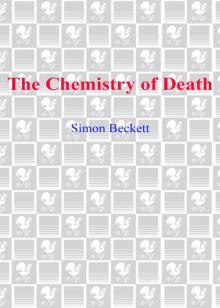 The Chemistry of Death
The Chemistry of Death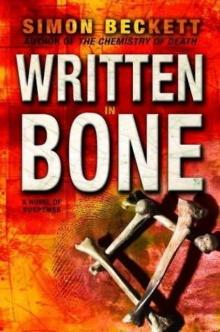 Written in Bone
Written in Bone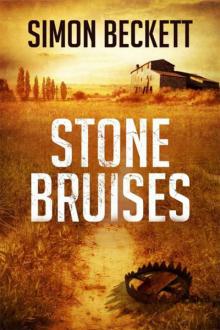 Stone Bruises
Stone Bruises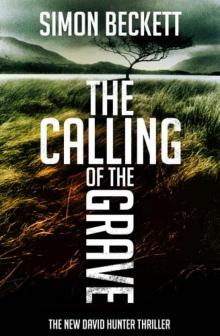 The Calling of the Grave
The Calling of the Grave Whispers of the Dead
Whispers of the Dead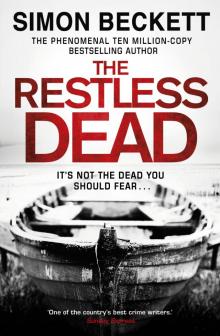 The Restless Dead
The Restless Dead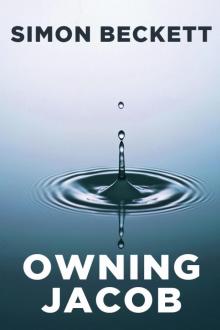 Owning Jacob
Owning Jacob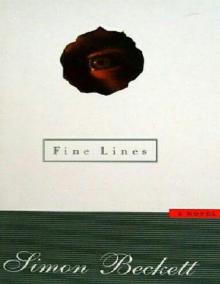 Fine Lines
Fine Lines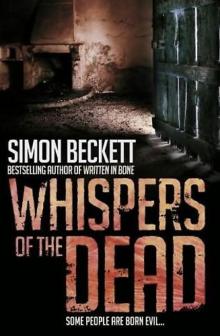 Whispers of the Dead dh-3
Whispers of the Dead dh-3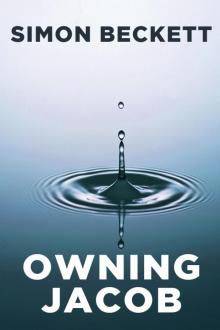 Owning Jacob (1998)
Owning Jacob (1998)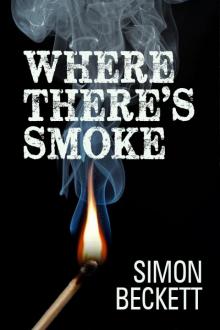 Where There's Smoke (1997)
Where There's Smoke (1997)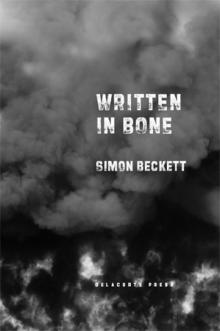 Written in Bone dh-2
Written in Bone dh-2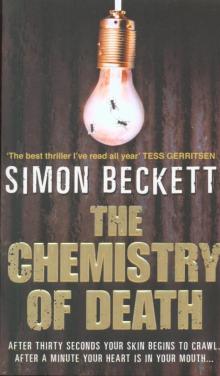 The Chemistry of Death dh-1
The Chemistry of Death dh-1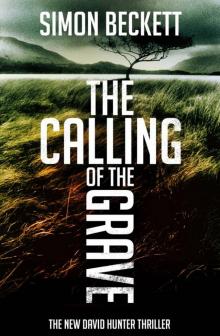 The Calling Of The Grave dh-4
The Calling Of The Grave dh-4